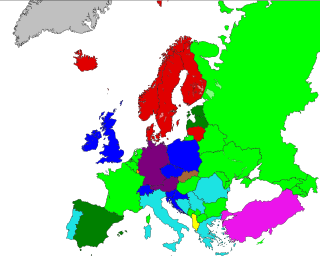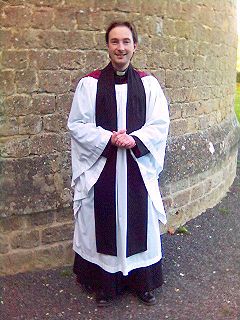
A television licence or broadcast receiving licence is a payment required in many countries for the reception of television broadcasts, or the possession of a television set where some broadcasts are funded in full or in part by the licence fee paid. The fee is sometimes also required to own a radio or receive radio broadcasts. A TV licence is therefore effectively a hypothecated tax for the purpose of funding public broadcasting, thus allowing public broadcasters to transmit television programmes without, or with only supplemental, funding from radio and television advertisements. However, in some cases the balance between public funding and advertisements is the opposite – the Polish TVP broadcaster receives more funds from advertisements than from its TV tax.

A curate is a person who is invested with the care or cure (cura) of souls of a parish. In this sense, "curate" correctly means a parish priest; but in English-speaking countries the term curate is commonly used to describe clergy who are assistants to the parish priest. The duties or office of a curate are called a curacy.
A mutual fund is an open-end professionally managed investment fund that pools money from many investors to purchase securities. These investors may be retail or institutional in nature. The term is typically used in the United States, Canada, and India, while similar structures across the globe include the SICAV in Europe and open-ended investment company (OEIC) in the UK.
The Lord Almoner's Professorships of Arabic were two professorships, one at the University of Oxford and one at the University of Cambridge. They were both founded before 1724, but records of the holders of the chairs only date from that year. The professors were appointed by the Crown and their salaries were paid by the Crown by a grant to the Lord Almoner. The Crown ceased to appoint the professors in 1903.
In the universities of Oxford, Cambridge, and Dublin, Bachelors of Arts of these universities are promoted to the degree of Master of Arts or Master in Arts (MA) on application after six or seven years' seniority as members of the university. As such, it is an academic rank, and not a postgraduate qualification. No further examination or study is required for this promotion.
Farming or tax-farming is a technique of financial management in which the management of a variable revenue stream is assigned by legal contract to a third party and the holder of the revenue stream receives fixed periodic rents from the contractor. It is most commonly used in public finance, where governments lease or assign the right to collect and retain the whole of the tax revenue to a private financier, who is charged with paying fixed sums into the treasury. Sometimes, as in the case of Miguel de Cervantes, the tax farmer was a government employee, paid a salary, and all money collected went to the government.
Annates were a payment from the recipient of an ecclesiastical benefice to the ordaining authorities. Eventually, they consisted of half or the whole of the first year's profits of a benefice; after the appropriation of right of consecration by the Vatican, they were paid to the papal treasury, ostensibly as a proffered contribution to the church. They were also known as the "First Fruits"', a concept which dates back to earlier Greek, Roman, and Hebrew religions.

Knight-service was a form of feudal land tenure under which a knight held a fief or estate of land termed a knight's fee from an overlord conditional on him as tenant performing military service for his overlord.

The progression of the British football transfer fee record tracks the increases in the record for the highest transfer fee paid or received by British association football clubs. A transfer fee is the sum of money paid by one club to purchase the contract, and therefore the playing services, of a professional footballer. Fees are not generally formally disclosed by the clubs involved, and discrepancies can occur in figures quoted in the press. Trevor Francis, for example, is regarded as Britain's first £1m player but was officially transferred for £975,000. The generally reported figure of £1,180,000 included Value Added Tax, fees to the Football League and Francis' signing fee. Discrepancies may also occur due to deals which involve additional sums to be paid at a later date after a player has made a certain number of appearances, joint fees for two or more players, or deals in which one player is exchanged for a sum of money plus another player.

Pishill is a hamlet in Pishill with Stonor civil parish about 5 miles (8 km) north of Henley-on-Thames in South Oxfordshire. It is in the Stonor valley in the Chiltern Hills about 430 feet (130 m) above sea level.
In English ecclesiastical law, the term incumbent refers to the holder of a Church of England parochial charge or benefice. The term "benefice" originally denoted a grant of land for life in return for services. In church law, the takings were spiritual ("spiritualities") and some form of assets to generate revenue were permanently linked to the duties to ensure the support of the office holder. Historically, once in possession of the benefice, the holder had lifelong tenure unless he failed to provide the required minimum of spiritual services or committed a moral offence. With the passing of the Pastoral Measure 1968 and subsequent legislation, this no longer applies, and many ancient benefices have been joined together into a single new one.

Perpetual curate was a class of resident parish priest or incumbent curate within the United Church of England and Ireland. The term is found in common use mainly during the first half of the 19th century. The legal status of perpetual curate originated as an administrative anomaly in the 16th century. Unlike ancient rectories and vicarages, perpetual curacies were supported by a cash stipend, usually maintained by an endowment fund, and had no ancient right to income from tithe or glebe.

The Exchange Bank of Amsterdam was an early bank, vouched for by the city of Amsterdam, established in 1609, the precursor to, if not the first, modern central bank.

A credit card is a payment card issued to users (cardholders) to enable the cardholder to pay a merchant for goods and services based on the cardholder's promise to the card issuer to pay them for the amounts plus the other agreed charges. The card issuer creates a revolving account and grants a line of credit to the cardholder, from which the cardholder can borrow money for payment to a merchant or as a cash advance.
Altarage is a term once commonly used in an ecclesiastical context to signify the revenue reserved for the chaplain in contradistinction to the income of the parish priest — it came to indicate the funds received by a priest from the laity when discharging a particular function for them, e.g., marriages, baptisms, and funerals. The term is largely obsolete, having been replaced by the more specific honorarium, stipend, or stole-fee.

Vicar is the title given to certain parish priests in the Church of England. It has played a significant role in Anglican Church organisation in ways that are different from other Christian denominations. The title is very old and arises from the medieval arrangement where priests were appointed either by a secular lord, by a bishop or by a religious foundation. Wherever there is a vicar he shares the benefice with a rector to whom the great tithes were paid. Vicar derives from the Latin "vicarius" meaning a substitute.

The Registrar of the University of Oxford is one of the senior officials of the university. According to its statutes, the Registrar acts as the "head of the central administrative services", with responsibility for "the management and professional development of their staff and for the development of other administrative support". He or she is also the "principal adviser on strategic policy" to the university's Vice-Chancellor and Council, its main decision-making body.
A commoner is a student at certain universities in the British Isles who historically pays for their own tuition and commons, typically contrasted with scholars and exhibitioners, who were given financial emoluments towards their fees.

California state elections in 2018 were held on Tuesday, November 6, 2018, with the primary elections being held on June 5, 2018. Voters elected one member to the United States Senate, 53 members to the United States House of Representatives, all eight state constitutional offices, all four members to the Board of Equalization, 20 members to the California State Senate, and all 80 members to the California State Assembly, among other elected offices.










